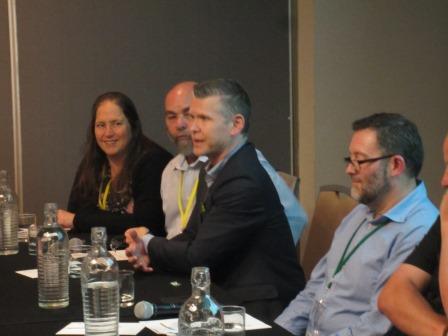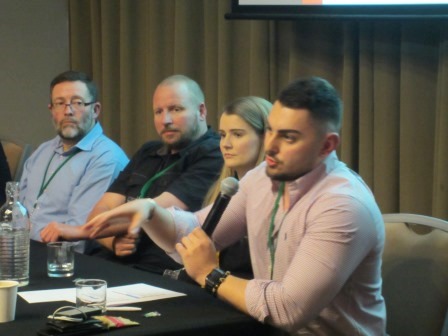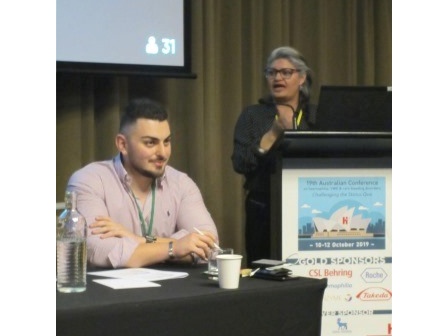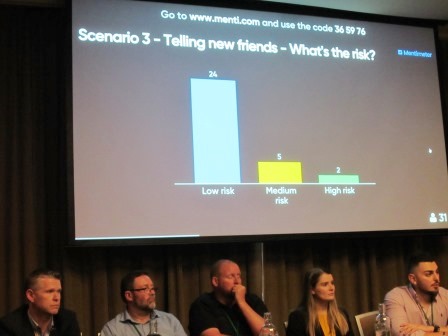How would you decide the risk involved with different scenarios?
The Youth session at the Conference was a lively debate between three teams – young people with bleeding disorders, adults from the next generation, and health professionals. And the audience could vote on their phones and then join the discussion with their point of view as well. Chaired by Dr Moana Harlen, the Senior Haemophilia Psychologist from the Queensland Children’s Hospital, the session bounced around the realities of life for a young person with a bleeding disorder. There were a few surprises – sometimes the young people were more cautious than the health professionals!

Scenario: You are going on a school camp. You don’t want to be excluded from activities and are already really cross that your action plan means you are not permitted to play hockey at camp. You decide to keep very quiet about your bleeding disorder and not tell anyone if you think you might be having a bleed – you will just deal with it yourself.
What did the young people and the next generation on the panel think about the session?

Alan has severe haemophilia and Sabrina has VWD.
What did you find most interesting about the Youth Session?
I feel that when the audience is interactive with the panel it makes it a bit more enjoyable, it allowed everyone to have a voice and say to the questions being asked.
Alan
The Youth session was most interesting to discover what other young adults go through with their blood disorder and how they cope with their bleeds, especially in regards to strategies and treatment plans. I didn’t realise that my blood disorder, von Willebrands, is very different to haemophilia in terms of treating injuries and internal bleeds. Thus it was great to get different perspectives from other youths and how they manage their lives.
Sabrina
Did anything in the Youth Session surprise you?
I think I surprised myself and others with how open I was with day-to-day life, prophylaxis and haemophilia.
Alan
Yes! I didn’t realise just how important it is to look after yourself when going through puberty. As a teenager, I told myself to ‘get over it’ or ‘grit your teeth and put up with the blood’. However, it was surprising to hear at the Youth session that any bleed that is abnormal should be attended to and treated accordingly.
Sabrina

Scenario: You have started at uni and met some new people. You really enjoy hanging out with them and you have a lot of shared interests. You can see some good friendships coming out of this. Should you tell them about your bleeding disorder?

Scenario: You are going to travel overseas in a couple of weeks and time has got away from you. You haven’t talked to your HTC yet. You know they are very busy and will not be happy that you have left things to the last minute. You are wondering if you should just pack the treatment product you have in your fridge and hope for the best.
THE NEXT GENERATION
Paul is a former member of the HFA Youth Committee and now an experienced community leader in South Australia. He describes himself as ‘mid 20s trapped in a 43-year old’s body’. Shane is the father of a young man with severe haemophilia.
What did you find most interesting about the Youth Session?
I thought there would be a greater divide between responses from the health professional, youth representatives, parents/older person with a bleeding disorder and the audience. However, everyone’s responses were pretty consistent with each other.
Paul
I thought it was quite interesting that there was such a broad spread of opinions across a number of the topics covered, even at times between the health professionals. It was really good that the session focused on the ‘risk’ and what I learnt was that there is not necessarily a single or ‘one size fits all’ answer. From the broad spread of answers, it was clear that each scenario presented different risks to different people. The key takeaway for me was that assessing the risk and having a clear plan for treatment/management is what is really important.
Shane
Haemophilia Foundation Australia acknowledges the Traditional Owners and Custodians of Country throughout Australia, the land, waters and community where we walk, live, meet and work. We pay our respects to Elders past and present and extend that respect to all Aboriginal and Torres Strait Islander peoples.
Sign up for the latest news, events and our free National Haemophilia magazine